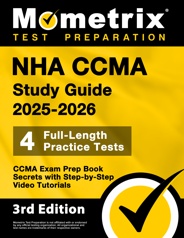The National Healthcareer Association (NHA) offers the Certified Clinical Medical Assistant (CCMA) credential to eligible medical assistants.
Click “Start Test” above to take a free CCMA practice test, and check out our premium-quality CCMA test prep resources by clicking the links below!
Exam Eligibility
To sit for the CCMA exam, you must have a high school diploma, GED, or some other equivalent. Additionally, you must have completed a medical assistant training or education program within the last five years or have one year of supervised work experience in medical assisting within the previous three years.
Requirements governing the practice of a medical assistant vary by state, so you should check your local rules and requirements before moving forward.
CCMA Exam Outline
The CCMA exam contains 180 multiple-choice questions, 30 of which do not count toward your score, and you are given a time limit of 3 hours. The unscored questions are called “pretest” questions, and they are randomly distributed throughout the exam. These questions are used by the exam administrators to evaluate questions that will appear on future exams as scored questions.
The exam is split into 7 domains, each of which has some combination of knowledge statements and task statements. Knowledge statements test you on pertinent knowledge that you should know as a medical assistant, while task statements test you on necessary duties that you need to be able to perform properly.
1. Foundational Knowledge and Basic Science
This domain contains only knowledge statements, which cover the following topics:
- Healthcare systems and settings
- Medical terminology
- Basic pharmacology
- Nutrition
- Psychology
2. Anatomy and Physiology
This domain contains only knowledge statements, which cover the following topics:
- Body structures and organ systems
- Pathophysiology and disease processes
- Microbiology
3. Clinical Patient Care
This domain contains both knowledge statements and task statements, which cover the following topics:
- General patient care
- Infection control
- Testing and laboratory procedures
- Phlebotomy
- EKG and cardiovascular testing
4. Patient Care Coordination and Education
This domain contains both knowledge statements and task statements, which cover the following topics:
- Preventative medicine and wellness
- Transition of patient care
- Collaboration with healthcare providers
- Referral forms and processes
- Tracking and reporting technologies
- Optimization of health outcomes via patient compliance
- Team-member roles and responsibilities
- Barriers to care
5. Administrative Assisting
This domain contains both knowledge statements and task statements, which cover the following topics:
- Diagnostic and procedural codes
- Electronic and paper-based scheduling and monitoring systems
- Clinical and administrative supply inventory
- Authorizations and pre-certifications
- Filing systems
- Urgency of appointment needs
- Telephone etiquette
- Chart review
- CMS billing requirements
- Data entry and data fields
- Advanced beneficiary notice (ABN)
6. Communication and Customer Service
This domain contains both knowledge statements and task statements, which cover the following topics:
- Communication between patients and providers
- Teamwork and team management
- Challenging customer service occurrences
- Active listening
- Communication styles
- Therapeutic communication
- Email etiquette
- Escalation of problem situations
- Coaching and feedback
- Scope of permitted questions
7. Medical Law and Ethics
This domain contains both knowledge statements and task statements, which cover the following topics:
- Adherence to the professional code of ethics
- Providing and collecting MOLST forms
- Power of attorney
- Informed consent
- Reporting laws
- Medical record storage
- Hippocratic Oath
- Medical malpractice
To help you prepare for the knowledge and task statements, take a look at the core knowledge and core skill items you should be familiar with:
Check Out Mometrix's CCMA Study Guide
Get practice questions, video tutorials, and detailed study lessons
Get Your Study Guide
Registration
Registering for the CCMA exam is a two-part process.
First, create an online NHA account, select the CCMA exam as your exam, and sign the attestation. Then, you will need to answer the prerequisite questions, including uploading your eligibility documentation and submitting your application. You can only select your exam date once your application is approved, which can take up to two weeks.
Second, once you’ve received your approval, select the date and location for your appointment. The CCMA exam is offered at PSI test centers located nationwide, or you have the option of live remote proctoring (LRP). The examination fee of $165 is payable at the time of registration and is accepted via credit card, debit card, or prepaid voucher.
LRP
Before registering for the remote proctor option, make sure your equipment meets the requirements. LRP requirements include the following:
- A desktop or laptop computer running at least a Windows 7 or Mac OS X operating system
- Google Chrome browser
- A webcam and microphone
- Minimum 466 kb/s bandwidth
- 2 GB RAM and 1 GB free disk space
- A minimum screen resolution of 1368×768
NHA and PSI strongly recommend running a system check before registering for the LRP delivery method. Additionally, your testing space needs to be free from distractions, out of the path of people coming in and out, and fully visible during your testing session.
How to Pass
Think you aren’t a good test-taker? Maybe on a study-time crunch? Or just don’t know how to begin studying? Mometrix has designed a new Study Secrets course to help every student, no matter what study scenario you are in. Here’s what you’ll find in the Study Secrets Course:
- Techniques to Conquer Procrastination
- Steps to building a Study Plan custom to your learning style
- 7 Effective Note-Taking Methods
- Test-Taking Tips
- Memory Techniques and Mnemonics
- And much more!
Everyone learns differently, so we’ve tailored our Study Secrets Course to ensure every learner has what they need to prepare for their upcoming exam or semester. Click below to check it out!
Test Day
On the day of your exam, you must present one form of valid government-issued photo identification with your signature. The name on your registration must match the name on your identification. For both delivery methods (on-site and remote), you should arrive or be logged in 30 minutes before your testing appointment.
In-person Testing
After you have provided your ID, your picture will be taken and your palm will be biometrically scanned for security purposes. You will then be asked to store all personal items in a secure locker, including your cell phone, hats, wallet, purse, coat, food, and papers.
Once your personal items are secured, you will enter the testing room and work through the identification screen and a tutorial at your testing station. Once this step is complete, your exam will begin.
LRP
The day before your exam, check the compatibility of your computer’s audio, video, and webcam components. If your computer runs any system update between when you schedule your exam and when you launch your exam, you may experience issues with compatibility. Best practice is to ensure any system update is postponed from the time you schedule to the time you complete your exam.
On the day of your exam, ensure that your testing area is clear of reference materials, your cell phone, and food or drink containers. You are permitted two pieces of blank paper and a writing utensil for writing notes. You must use the Google Chrome browser and enable cookies. Ensure you can move the webcam around for the proctor so they can view your area. Present your ID and scratch paper for inspection and follow any directions provided.
You can launch the examination up to 30 minutes before your scheduled appointment. You cannot leave the webcam’s view during your exam, use other monitors, or talk to anyone. If the proctor observes questionable behavior, your exam will be canceled.
How the CCMA Exam is Scored
If you took the exam at your school or organization, a preliminary score report is available at the end of your exam. Computer-based exams taken at a PSI testing center or via LRP receive notification within 48 hours of completing the exam. The preliminary result is not your official report. When your official score report is available, you will receive an email notification to view your information in your NHA online account.
From your account, you can see your score report that indicates your score, passing status, and diagnostic information on your performance in each of the domains. The diagnostic information breaks down your performance in the domains by identifying one of three measures: above the passing standard, near the passing standard, or below the passing standard. The passing standard is 390 on a scale of 200 to 500 (you must answer 78% of the questions correctly).
Retaking the CCMA
If you need to retake the CCMA exam, you can register as a returning candidate after a 30-day waiting period. You do not need to submit an application, but you do need to schedule your exam and pay the $160 examination fee.
You can take the exam three times, with a 30-day waiting period between each attempt. Failure of the exam on the third attempt requires a one-year waiting period before retaking the exam. Each retake attempt requires registration and payment of the full examination price.
FAQs
Q
How many questions are on the CCMA exam?
A
There are 180 multiple-choice questions, 30 of which are unscored pretest questions.
Q
How long is the CCMA exam?
A
The time limit for the exam is 3 hours.
Q
What is the passing score for the CCMA exam?
A
To pass the exam, you will need to achieve a scaled score of 390, which means you will need to answer 78% of the questions correctly.
Q
How much does the CCMA exam cost?
A
The examination fee is $165.
Affiliate disclosure: As an Amazon Associate, we may earn commissions from qualifying purchases from Amazon.com.
Mometrix Test Preparation is not affiliated with or endorsed by any official testing organization. All organizational and test names are trademarks of their respective owners.




